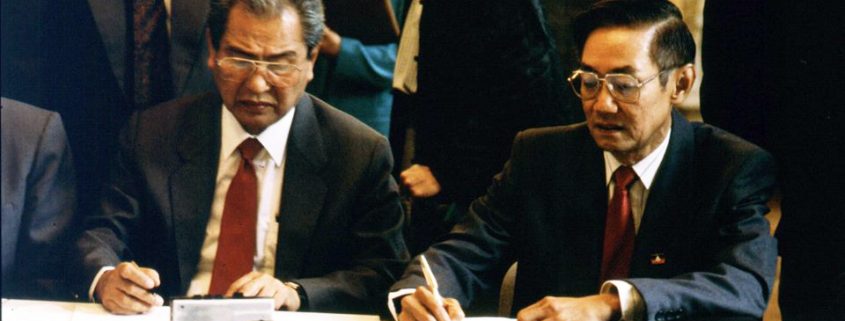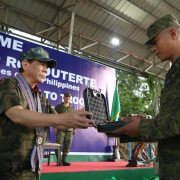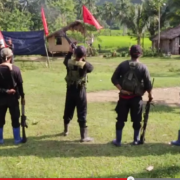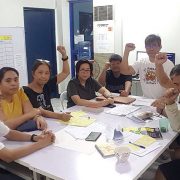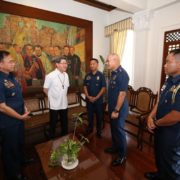Peace advocates commemorate The Hague Joint Declaration’s 25th signing anniversary
Peace advocates are commemorating today the 25th anniversary of the signing of The Hague Joint Declaration as the framework of the peace negotiations between the Manila government and the National Democratic Front of the Philippines (NDFP) at the University of the Philippines in Quezon City.
Lawmakers and legal luminaries, religious leaders, human rights activists and professionals in various fields as well as representatives of various sectors and the national minority groups camped out at the university are gathering at the university’s Asian Center for the event scheduled at two o’clock.
“At a time when the peace talks have been stalled or on the brink of termination, The Hague Declaration reminds us why there are peace talks in the first place,” Bagong Alyansang Makabayan secretary general Renato Reyes said in a statement
Signed in The Hague, the Netherlands on September 1, 1992, the agreement outlines the objective of peace negotiations as well as the substantive agenda that need to be negotiated to achieve “just and lasting peace.”
According to the declaration, the peace talks between the Government of the Republic of the Philippines (GRP) and the NDFP were intended to address the roots of the armed conflict by forging agreements on human rights and international humanitarian law, socio-economic reforms, political and constitutional reforms before the end of hostilities can take place.
The Hague Joint Declaration also laid down the sequence of the negotiations, starting with an agreement on respect for human rights and international humanitarian law, social and economic reforms, political and constitutional reforms, and the cessation of hostilities and disposition of forces of both parties.
The Comprehensive Agreement on Respect for Human Rights and International Humanitarian Law has been signed by the GRP and the NDFP last March 16, 1998, also in The Hague.
Considered to be a landmark document for peace negotiations all over the world, the declaration binds both the GRP and the NDFP to “mutually-acceptable principles, including national sovereignty, democracy and social justice, and no precondition whatsoever shall be made to negate the inherent character and purpose of the peace negotiations.”
‘Document of perpetual division’
The Gloria Arroyo, Benigno Aquino and Rodrigo Duterte governments have all reaffirmed The Hague Joint Declaration among other major peace agreements when these were seeking to restart formal peace negotiations with the NDFP.
The declaration, however, had been under consistently undermined by the GRP demanding ceasefires between the New People’s Army and the Armed Forces of the Philippines-Philippine National Police before further discussions on social and political reforms as well as political and constitutional reforms may proceed.
While the NDFP consistently insisted the declaration must remain as the framework of the peace negotiations, the GRP has since adamantly demanded for ceasefires as “specific measures of goodwill and confidence-building” to “create a favourable climate” for the negotiations as stated in The Hague Joint Declaration.
Teresita Deles, peace adviser to both the Arroyo and Aquino, was reported to have said that The Hague Joint Declaration is “a document of perpetual division” while immediate past GRP panel head Alexander Padilla wanted a new track separate from the declaration.
While periodically agreeing to declaring ceasefires, the NDFP said these are just goodwill measures and are not preconditions to the holding of the talks.
The Communist Party of the Philippines and the NPA said they had no choice but to cancel their unilateral ceasefire declaration following gross violations committed by GRP armed forces against the guerrillas and the civilian communities.
Continuing relevance
In his message, NDFP Chief Political Consultant Jose Maria Sison said The Hague Joint Declaration and is still needed to guide the peace negotiations.
“[The declaration} give the two negotiating sides ample space to negotiate and make mutually satisfactory agreements for the benefit of the Filipino people,” Sison said.
The CPP founder said that with The Hague Joint Declaration as framework the possible outcome of the negotiations for a just and lasting peace can only consist of social, economic, political and constitutional reforms.
“The mutually satisfactory agreements can raise the level of national independence, democracy, and economic development through national industrialization and genuine land reform, social justice, expansion of social services, a patriotic, scientific and mass culture and education, national self defense and independent foreign policy,” Sison said. # (Raymund B. Villanueva)

